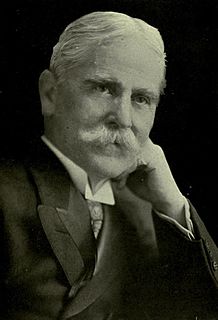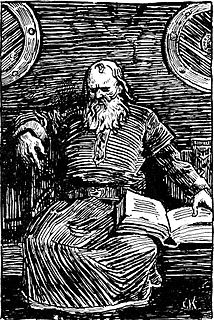A Quote by Herman Melville
Were this world an endless pain, and by sailing eastward we could forever reach new distances, and discover sights more sweet and strange than any Cyclades or Islands of King Solomon, then there were promise in the voyage.
Related Quotes
Dreams were the worst. Of course I dreamed of food and love, but they were pleasant rather than otherwise. But then I'd dream of things like slitting a baby's throat, mistaking it for a baby goat. I'd have nightmares of other islands stretching away from mine, infinities of islands, islands spawning islands, like frogs' eggs turning into polliwogs of islands, knowing that I had to live on each and every one, eventually, for ages, registering their flora, their fauna, their geography.
What seems certain is that Pythagoras developed the idea of mathematical logic. He realized that numbers exist independently of the tangible world and therefore their study was untainted by inaccuracies of perception. This meant he could discover truths which were independent of opinion of prejudice and which were more absolute than any previous knowledge.
In those same decades, most UFO sightings were made in the daytime and frequently at close range, when shapes and surface features could be distinguished, thus making positive identification of normal sights easier and the descriptions of unusual sights more detailed. When all normal explanations had been eliminated, the witnesses could concentrate on those aspects of the experience which were most abnormal.
If all the skies were sunshine Our faces would be fain To feel once more upon them The cooling splash of rain. If all the world were music, Our hearts would often long For one sweet strain of silence, To break the endless song If life were always merry, Our souls would seek relief, And rest from weary laughter In the quiet arms of grief.
For more than 50 years, men and women around the world have reported sights in the sky that are strange to their experience and understanding. Inasmuch as many of these sights appeared to be solid objects having impressive performance, they have become known as Unidentified Flying Objects (UFOs) or, colloquially, flying saucers. Their positive identification is one of the major public scientific challenges of the era, with a significant number of these sights so far defying all reasonable efforts at classification.
The women all had big minds because they were big animals, but they didn't use them for this reason: unusual ideas could make enemies and the women, if they were going to achieve any sort of comfort and safety, needed all the friends they could get. So, in the interest of survival they trained themselves to be agreeing machines. All their minds had to do was to discover what other people were thinking and then they thought it too.
I was a big fan of a writer named Jack Vance, a science fiction writer. He always wrote about these guys who were either going down a river in a strange world or would be in this one land where people acted really strange, and he'd have these interactions with them that were strange - he'd usually get run out of town or something. Then he'd end up in the next town over where the rules were totally different. And I love this stuff.
Some people reckoned up all King Harald's (King of Norway) great achievements, and said that nothing would be too difficult for him. But there were others who said that England would be very hard to conquer. It was very populous and the warriors who were known as the king's Housecarls were so valiant, that any one of them was worth two of the best in King Harald's army
Music became less understandable in the wake of the new MTV era. You weren't supposed to be anything other than a pop star, to not go deeper than that. It was really strange. It was suffocating, image-wise. What you could talk about in a song changed; if you were misunderstood, you were really misunderstood - taken literally.






































